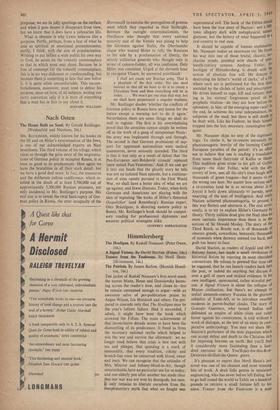Nach Osten
The House Built on Sand. By Gerald Reitlinger. (Wcidenfeld and Nicolson, 36s.)
MR. REITLINGER, widely known for his books on the SS and on Hitler's extermination of the Jews, is one of our acknowledged experts on Nazi beastliness. The third volume of his trilogy, which takes us through the grim story of the tergiversa- tions of German policy in occupied Russia, is at least as good as its predecessors. Here again we have the brutalities in all their stark detail; but we have a good deal more. In fact, the massacres and the deliberate callous indifference, which re- sulted in the death of at least 3,700,000 out of approximately 5,500,000 Russian prisoners, are only incidental to Mr. Reitlinger's purpose. His real aim is to reveal the total bankruptcy of Ger- man policy in Russia, the utter incapacity of the
Herrenvolk to exercise the prerogatives of govern- ment which they regarded as their birthright. Between the outright exterminationists, the Ostidioten who thought that every national minority east of the Vistula was pining to help the Germans against Stalin, the Oberlaender clique who wanted Hitler to rally the Russians to his side by a proclamation of liberty, the strictly utilitarian generals who thought only in terms of cannon-fodder, all was confusion. Only Hitler was consistent. Urged at the eleventh hour to recognise Vlasov, he answered pointblank : I shall not create any Russian army. That is
a phantom of the first order. No one need instruct us that all we have to do is to create a Ukrainian State and then everything will be in order. . . . We won't get one man that way, but we shall have perpetuated a singular madness.
Mr. Reitlinger doubts 'whether the conflicts of German policy in Russia have any lesson for the future except a warning not to do it again.' Nevertheless there are some things we shall do well to register. The first is his overwhelming proof that the atrocities cannot simply be written off as the work of a gang of unrepentant Nazis: the army was implicated through and through. The second is that German professions of sup- port for oppressed nationalities were tactical manoeuvres, never seriously intended. The third is that it was only as a result of defeat that 'the Pan-European anti-Bolshevik crusade' replaced 'pure naked Pan-Teutonism.' And if we can get it into our heads that the ghastly story he tells was not an isolated Nazi episode, but a continua- tion of aims openly pursued in the First World War, we shall have a better idea of what we are up against, and fewer illusions. Today, when both Germans and Americans are playing with the idea of repeating 'the tricks of Hitler's thwarted Ostpolitiker' (and Rosenberg's Russian expert, Otto Briutigam, is directing eastern policy in Bonn), Mr. Reitlinger's book should be compul- sory reading for professional diplomats and amateur political strategists alike.
GEOFFREY BARRACLOUGH


































 Previous page
Previous page